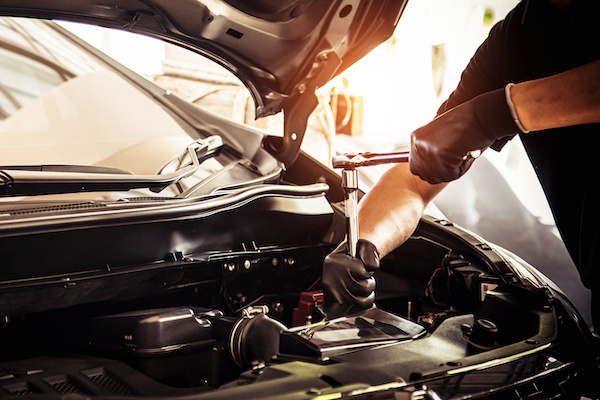Posted on 10/27/2022

The most frequent causes of a car not starting are a worn-out or dead battery, frayed or corroded connection wires, a faulty alternator, or an issue with the starter. It can be difficult to determine whether a battery or alternator problem is present. Here's how to identify the offender. Consider a failing battery, a loose or corroded connection, or an electrical draw if your car cranks slowly, starts inconsistently, is harder to start on chilly mornings, or doesn't make any sound or light up the interior when you try to start it. A low battery with terminal corrosion that is obvious is likely damaged. If a jumpstart is successful, a battery issue is present. However, you must also determine whether it is just nearing the end of its life or whether there are more serious problems. A malfunctioning alternator may be the cause of a dead or depleted battery. No-starting and difficult starting, dimmer lights, and issues with sound system output are a few of the things to watch out ... read more
Posted on 9/28/2022

When it comes to automotive maintenance, the 30,000-mile, 60,000-mile, and 90,000-mile marks are very important. You might have seen the numbers jumbled up together to be called the 30/60/90K plan. What makes this so-called plan so significant? Read on to learn more. While the numbers may seem daunting at first, they are simply checkpoints or intervals at which your automaker has set forth certain maintenance tasks. Every 30,000 miles, give or take, your car should undergo a series of services to benefit the overall health of your car. Another term that is commonly interchangeable with this service is factory-scheduled maintenance. Many motorists believe that this is a fancy way for automakers to scheme and come for their customers’ wallets. However, that is far from the case. In fact, these services aren’t required to be done at the dealership at all. At Torque Automotive, we are proud to help our customers with 30/0/90K maintenance to impro ... read more
Posted on 8/31/2022

The term “spongy” brake pedals simply means that your brake pedals feel squishy, soft, and generally slow responding. While you may try to brush it off, a sponge-like brake pedal is extremely dangerous as it alters your car’s stopping power or time. Read on to learn what could be causing your spongy brake pedals. 1. Loose or Leaky Brake Lines If the brake fluid lines are loose or holy, it will cause a brake fluid leak. When your braking system loses the hydraulic pressure, your braking power will decrease. 2. Worn Brake Components Another explanation for your spongy brake pedal is a potential mechanical problem with the brake parts themselves. Your braking system is complex and comprises many parts, including brake pads, calipers, and more. 3. Problem with the Power Booster The power booster assists you with easy braking. Otherwise, you’d have to apply a lot more pressure to stop your car. If there is an issue with this piece, it can cause the brake pedal ... read more
Posted on 7/25/2022

Preparing for a road trip takes more than packing enough snacks and clothes. You need to make sure the car will take you to your destination without any road hiccups. Here are some car maintenance services to check before embarking on a long trip. 1. Examine the fluid Replace the filters and top off all the low fluids. Check the level of engine oil, transmission fluid, power steering, and windshield washer fluid. If the next oil change is close, consider doing it before the trip. Confirm if your car's engine coolant (antifreeze) tank is filled to the level recommended by the car manufacturer. Over time, coolant can become acidic, so you may want to have your coolant tank checked for rust. A rusty tank could hurt other parts of the car, like the radiator or the hoses. 2. Battery Ensure your battery is fully charged before embarking on the trip. Start your car and look at the headlights to see if the battery is still good. If they are dim, the battery needs more power to work pr ... read more
Posted on 6/30/2022

Knowing the operations of your vehicle is just as important as knowing how to drive it. To be specific, the power steering system is something that most drivers don’t understand. Read on to learn more about what the power steering system has to offer. What Is Power Steering? Most cars nowadays have electric power steering systems, while older power steering systems are hydraulic. From small cars to large trucks, power steering is necessary to allow complete control of their vehicle. Without the power steering system, it would take an enormous amount of effort to steer your vehicle left and right or to make turns. Since it plays such an important role in driving, your power steering system requires regular maintenance. Without frequent inspections and service, your power steering system can go wrong. It can end up putting your safety at risk. Common Power Steering Repairs Power steering fluid Slipping belt Cracked or worn hoses Damaged steerin ... read more